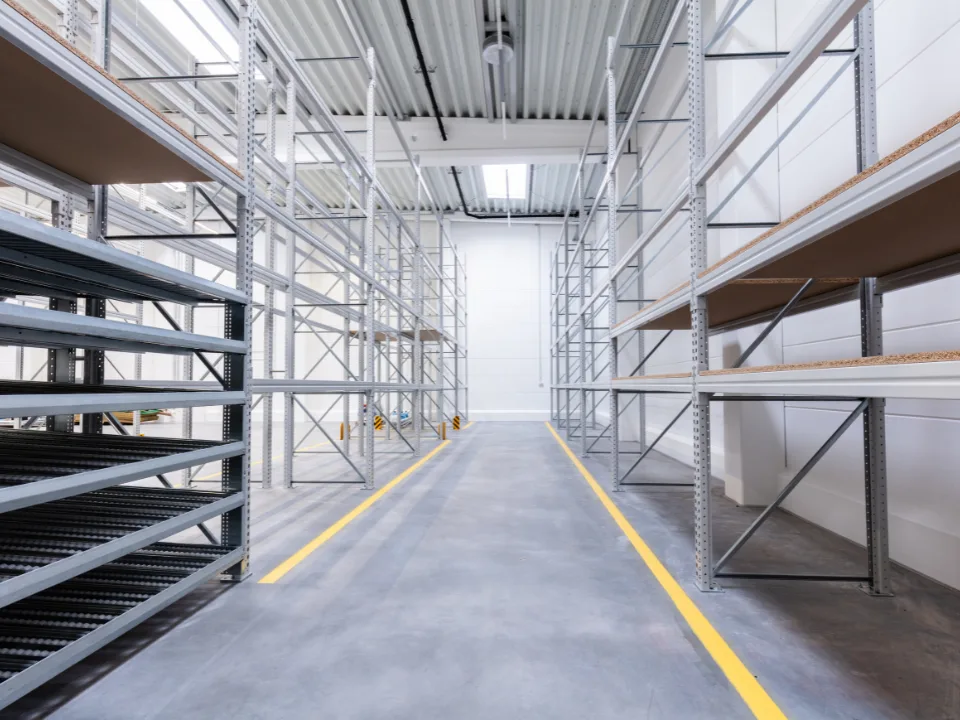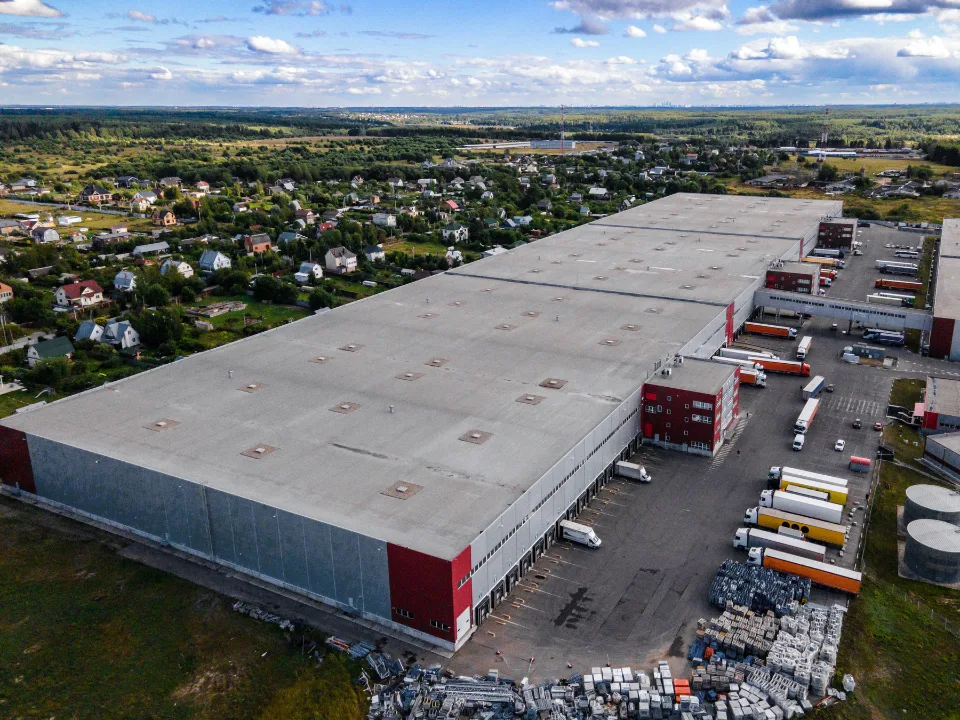Small Warehouses Are in High Demand but Short Supply
Despite overall rising industrial availability, sub-100 KSF warehouses remain scarce, with just a 3.9% vacancy rate.
Good morning. Despite overall rising industrial availability, sub-100 KSF warehouses remain scarce, with just a 3.9% vacancy rate, as developers focus on building larger logistics hubs.
This issue is brought to you by Agora—streamline your fundraising efforts and raise capital faster.
🎙️ No Cap hosts Alex Gornik and Jack Stone talk C-PACE financing with Robbie Pinkas, SVP at PACE Loan Group—breaking down how it funds energy-efficient upgrades and when it makes sense for real estate projects.
Market Snapshot
|
|
||||
|
|
*Data as of 02/14/2024 market close.
INDUSTRIAL TRENDS
Small Warehouses Are Disappearing—And Businesses Are Feeling It
Even as overall warehouse vacancies rise, demand for smaller spaces is outpacing supply, leaving businesses scrambling for solutions.
Tight market: The vacancy rate for U.S. warehouses under 100,000 square feet was just 3.9% in Q4 2024, significantly lower than the overall warehouse vacancy rate of 6.7%, according to Cushman & Wakefield. Larger warehouses—those over 100,000 square feet—saw even higher vacancies at 10.1%, underscoring a widening gap in supply.
Big-box boom: Over the past five years, developers have prioritized large warehouses—typically over 100,000 square feet—to meet the demands of e-commerce. In 2024, only 8% of newly built warehouses were under that size, as bigger facilities provide better economies of scale and higher returns.
The challenge: Smaller warehouses are often located in urban and suburban areas, where land is scarce and costs are higher. These challenges make them less attractive to developers, further tightening the supply for businesses.
➥ THE TAKEAWAY
What’s next? Retailers and logistics providers seeking smaller footprints are feeling the squeeze, with many struggling to find available space. To fill this growing gap, companies like WareSpace and ReadySpaces are stepping in with flexible, short-term warehouse solutions, offering a much-needed alternative in an increasingly tight market.
TOGETHER WITH AGORA
Hundreds of real estate firms trust Agora. See why.
Hundreds of real estate investment firms rely on Agora to streamline operations, automate workflows, and scale effortlessly. Outdated systems and manual processes create inefficiencies—Agora eliminates these barriers, providing firms with everything they need to operate smarter and grow faster.
With Agora, you can:
-
Automate back-office processes to improve operational efficiency
-
Strengthen investor relationships with the best investor experience
-
Streamline financial operations with automated reporting, distributions, and tax solutions
-
Simplify investment management with CRM, data rooms, and investor onboarding tools
Experience the future of real estate investment management—get started now.
*Disclosure: This is a paid advertisement. Please read the disclosure at the bottom of the newsletter.
✍️ Editor’s Picks
-
Get a Quote: C-PACE finances office renovations that lead to conversions or improvements to tenant areas without recourse for up to 30 years in most states—even for improvements completed in the previous 3 years.
-
Flood rule paused: FEMA has stopped enforcing a rule requiring public buildings in flood zones to be rebuilt with stronger protections, raising legal and safety concerns.
-
DOGE budget cuts: Potential federal budget cuts by the Department of Government Efficiency (DOGE) could force companies reliant on government contracts to also cut their office space and workforce.
-
Deal of the day: Investor David Werner is set to acquire the 42-story Mobil building at 150 East 42nd Street for over $900M from Hiro Real Estate LLC.
🏘️ MULTIFAMILY
-
Top apartment sales: Five major apartment properties sold for $250M+ each in 2024, signaling a rebound in multifamily investment despite rising cap rates and economic uncertainty.
-
Brotherly love: Philadelphia has overtaken Miami as the top relocation destination for New Yorkers, driven by lower housing costs and strong suburban rental demand.
-
Tower tops off: PMG and E11even Partners have topped off the first of two club-branded condo towers in downtown Miami, with the sold-out project set to finish later this year.
🏭 Industrial
-
Loan of the day: Blackstone Mortgage Trust (BXMT) is financing 49 outdoor industrial storage lots for Alterra, supporting e-commerce growth amid limited supply and high investor interest.
-
Atlanta hub: Prologis (PLD) is developing two last-mile distribution centers in central Atlanta, marking the first major industrial project in the area in 25 years.
🏬 RETAIL
-
On second thought: Unibail-Rodamco-Westfield has reversed plans to exit the US market, opting to retain its 11 flagship malls while continuing to sell non-core assets.
-
Sales drop 0.9%: January US retail sales fell the most in nearly two years, impacted by winter storms, wildfires, and cautious consumer spending amid inflation and high borrowing costs.
-
Refi secured: 21 Alpha Group JV secured a $32M loan from Forbright Bank to refinance Crenshaw Plaza, a 146.9 KSF grocery-anchored retail center in Los Angeles.
🏢 OFFICE
-
Foreclosure suit: Rialto Capital Advisors filed a foreclosure suit against RFR for defaulting on a $104.5M loan at 90 Fifth Ave, adding to the firm's recent financial struggles.
-
Exiting Dallas: Saks is closing Neiman Marcus' Dallas HQ at Cityplace Tower as part of a corporate office consolidation, which will impact an 82 KSF lease and city incentives.
-
Fort Lauderdale sale: DWS sold 401 E. Las Olas Blvd. for $220M to a partnership led by Highline Real Estate, marking the market's largest office deal in a decade.
🏨 HOSPITALITY
-
Bargain deal: Beach Point Capital acquired Brooklyn’s historic Hotel Bossert in an uncontested foreclosure auction with a $120M credit bid, taking over from Chetrit Group.
📈 CHART OF THE DAY

The Michigan survey links the inflation jump to tariff concerns. Daily inflation expectations rose after two key Trump tariff announcements, and one-third of respondents mentioned tariffs—up from less than 2% pre-election. With inflation still fresh, consumers expect tariffs to drive prices higher, which could make those fears self-fulfilling and limit the Fed’s ability to overlook tariff-driven inflation.

You currently have 0 referrals, only 1 away from receiving B.O.T.N Multifamily Deal Screener .
What did you think of today's newsletter? |


















